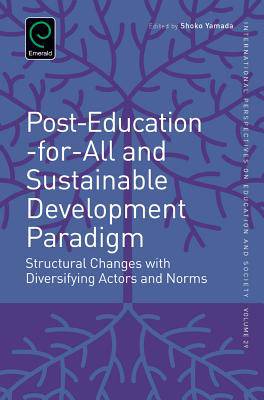
- Afhalen na 1 uur in een winkel met voorraad
- Gratis thuislevering in België vanaf € 30
- Ruim aanbod met 7 miljoen producten
- Afhalen na 1 uur in een winkel met voorraad
- Gratis thuislevering in België vanaf € 30
- Ruim aanbod met 7 miljoen producten
Zoeken
Post-Education-For-All and Sustainable Development Paradigm
Structural Changes with Diversifying Actors and Norms
€ 302,95
+ 605 punten
Omschrijving
As the target year of achieving Education for All development goals approached in 2015, there were discussions about the post-EFA agenda, a process parallel to setting the post-Millennium Development Goals. This transition should not be understood simply as a normative framework. It has coincided with changes in structure, actors, modes of interactions, and practices. The emergence of new types of donors who used to be recipients of aid is changing the landscape of international educational development. Transnational networks of civil society actors gained power to set the discourse at multiple levels, through their global mission-driven and expertise-based advocacy. Advanced communication technologies and broader participation increased the amount of ideas exchanged, while the global governance structure becomes more centralized in its decision making.
Specificaties
Betrokkenen
- Uitgeverij:
Inhoud
- Aantal bladzijden:
- 392
- Taal:
- Engels
- Reeks:
- Reeksnummer:
- nr. 29
Eigenschappen
- Productcode (EAN):
- 9781784412715
- Verschijningsdatum:
- 27/06/2016
- Uitvoering:
- Hardcover
- Formaat:
- Genaaid
- Afmetingen:
- 157 mm x 231 mm
- Gewicht:
- 793 g

Alleen bij Standaard Boekhandel
+ 605 punten op je klantenkaart van Standaard Boekhandel
Beoordelingen
We publiceren alleen reviews die voldoen aan de voorwaarden voor reviews. Bekijk onze voorwaarden voor reviews.






